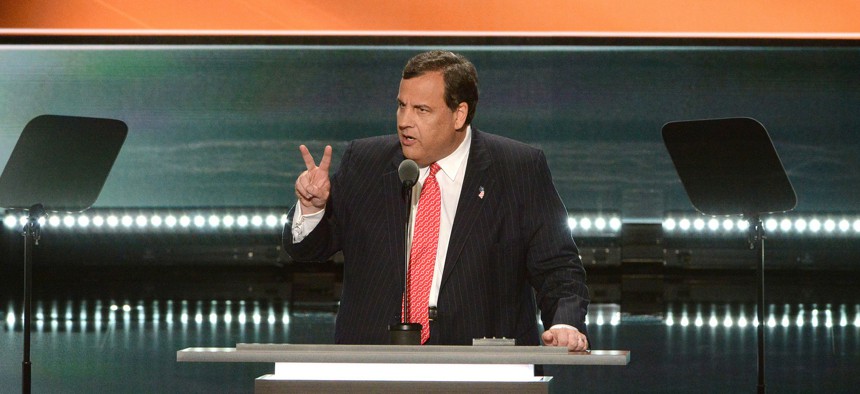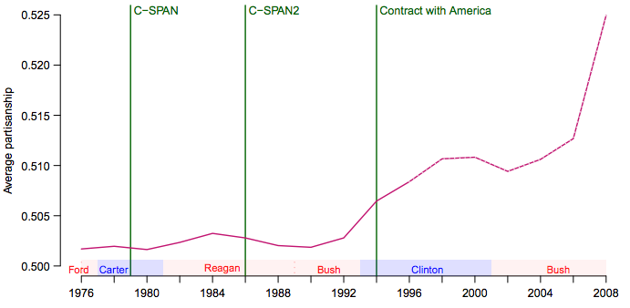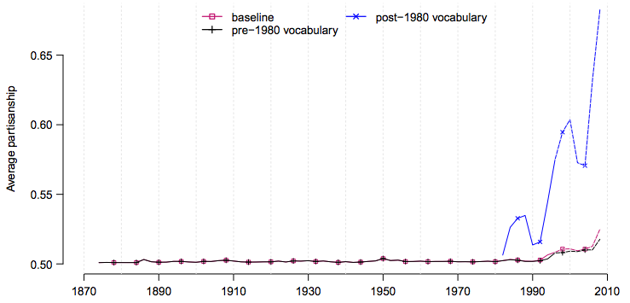
Fred Watkins/ABC via Flickr
Why Democrats and Republicans Speak Different Languages
The Republican National Convention proved yet again that the GOP talks about America and U.S. policy with an entire unique vocabulary. It hasn’t always been this way.
On Thursday night, Donald Trump and other speakers at the Republican National Convention talked about “radical Islamic terrorism,” “illegal aliens,” and “Crooked Hillary.” In a few weeks, at the Democratic National Convention, you likely won’t hear any of these terms. The Obama administration refuses to associate terrorism with Islam, for fear of legitimizing it. Democrats are far more likely to talk about “immigrants” and “undocumented workers” than aliens. And it will be quite shocking, at a level far beyond Ted Cruz’s speech on Wednesday night, if a keynote speaker addresses Hillary Clinton with her nom de Trump.
For several decades now, Republicans and Democrats have become more polarized. There are plenty of reasons for that, including the demise of the Southern Dixiecrats and the geographic sorting of the country into ideologically homogenous neighborhoods. But the two major parties are now divided by a common language: Democrats discuss “comprehensive health reform,” “estate taxes,” “undocumented workers,” and “tax breaks for the wealthy,” while Republicans insist on a “Washington takeover of health care,” “death taxes,” “illegal aliens,” and “tax reform.” When did the two major political parties create their own vocabularies?
Around 1990. That’s according to a fascinating new paper by the economists Matthew Gentzkow and Jesse M. Shapiro and Microsoft Research’s Matt Taddy. Americans have for decades signaled their political clique with specific terms—as when Southerners refer to the Civil War as the “War of Northern Aggression,” or Northerners call it the “Great Rebellion.” What is different today, the researchers said, is “the magnitude of the differences, the deliberate strategic choices that seem to underlie them, and the expanding role of consultants, focus groups, and polls” to entrench two separate political lexicons within the same polity.
In the paper, they have a simple but specific definition of partisanship: “the ease with which an observer could guess a speaker’s party based solely on the speaker’s choice of words.” This definition of partisanship scarcely changed between 1870 and 1990. For roughly 120 years, the probability of correctly guessing a speaker’s party by listening to a one-minute speech was about 52 to 55 percent, nearly random. But suddenly, in the early 1990s, rhetorical partisanship exploded.
The Rise of Partisan Language in Congress

“The 1994 inflection point in our series coincides precisely with the Republican takeover of Congress led by Newt Gingrich” and his Contract With America, they find. Gingrich’s revolution helped to introduce and/or popularize terms like “tax relief,” which at the time were seen as a distinctly conservative frame, as opposed to “tax cut” (or, more partisan, “tax giveaway”).
But the polarization of language did not stop when Gingrich left Washington. The Contract With America kicked off a neologism arms race, a prolonged attempt by members of both parties to coin catchy new terms for their pet policies, particularly for taxes, immigration, and health care. This neologism burst—defined as words and phrases first popularized after 1980—continued through the end of the 20th century and into the 21st century. Both Republicans and Democrats became more disciplined about defining their agendas in partisan-specific terms and getting other members of their parties to speak the same language.
The Rise of Partisan Neologisms

Another inescapable variable here is the significant shift in media technology. Between 1984 and 1992, the cable industry spent more than $15 billion expanding its infrastructure—the “largest private construction project since World War II”—and the number of cable channels nearly tripled in that decade.
The diversity of media, alone, cannot explain the growing partisanship of language. After all, in the 19th century, there were hundreds of ethnic newspapers in the New York and New Jersey area, alone, serving socialists, conservatives, Jews, Swedes, and Italians. But the cable revolution was different by an order of magnitude: Each channel had the potential to reach tens of millions of cable-subscribing voters.
C-SPAN was introduced to the House of Representatives in 1979, and C-SPAN2 joined to film the Senate in 1986. “This plausibly increased the return to carefully crafted language, both by widening the reach of successful sound bites, and by dialing up the cost of careless mistakes,” the researchers write. In The C-SPAN Revolution, Stephen Frantzich and John Sullivan quote Newt Gingrich as saying he would have never been the Republican leader without C-SPAN. Fox News launched in 1996, and its success covering the conservative movement encouraged MSNBC to shift more and more leftward over the next decade, until finally there were two clear channels for partisan messaging.
There is little inherently dangerous about the popularization of synonymous terms. Millions of Americans say they drink “pop,” millions of Americans prefer the term “coke,” and they are all wrong because the proper terminology is “soda.” These differences hurt no one, even if their out-of-state usage might occasionally confuse a drug-store clerk.
But the Cambrian explosion of partisan neologisms is not as anodyne as the soda/pop divide. First, it’s not good that Republicans and Democrats see political expedience in accentuating their separateness down to the way they describe a reduction in taxes on households earning more than a million dollars. It is, rather, a sign that both parties are predominantly interested, not in converting the other side, but rather in speaking to the converted flock.
Second, devoting all this energy to building separate lexicons creates the impression that words are as important as policies. They are most certainly not. Coming up with a catchy name for the Iraq War doesn’t change a single substantive fact about its outcome. Despite what you’ve heard, harping on the words “radical,” “Islamic,” and “terrorism” is not a foreign policy. It is the reduction of a complex international crisis into a diction contest.
When politics devolves into a war over word choice, it is probably a sign that all hope for a more substantive debate has already been lost.
NEXT STORY: For Trump, It’s Not Morning In America Anymore






